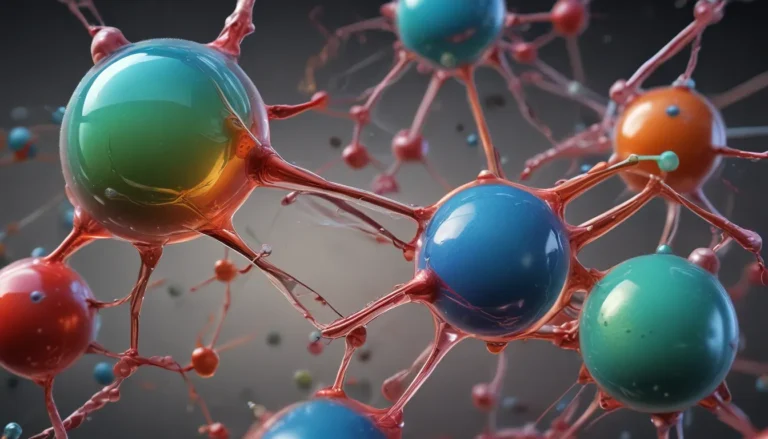A Note About Images: The images used in our articles are for illustration purposes only and may not exactly match the content. They are meant to engage readers, but the text should be relied upon for accurate information.
Are you curious about the groundbreaking scientific technique known as mass spectrometry? This powerful analytical method has revolutionized fields such as chemistry, biology, and forensics, providing researchers with invaluable insights into the composition and structure of matter. In this article, we will delve into nine captivating facts about mass spectrometry, showcasing its significance and the remarkable discoveries it has enabled. From its historical origins to its modern-day applications, mass spectrometry continues to shape our understanding of the physical world and push the boundaries of scientific discovery. So, let’s embark on a journey to unravel the fascinating world of mass spectrometry together!
Key Insights:
- Mass Spectrometry’s Versatility: Used in chemistry, biology, pharmacy, and environmental science to identify molecules and analyze complex mixtures.
- Continuous Evolution: Constantly advancing with new techniques and advancements, making it indispensable in various fields.
- Impactful Applications: From drug discovery and proteomics research to environmental analysis and forensic investigations, mass spectrometry plays a crucial role in diverse areas of study.
Unveiling the Power of Mass Spectrometry
Mass spectrometry stands as a versatile and essential analytical tool utilized across a plethora of scientific disciplines. By examining the mass-to-charge ratios of ions, this technique enables researchers to identify and characterize molecules with unparalleled precision and accuracy. Whether it’s deciphering the composition of a complex mixture or determining the molecular masses of substances, mass spectrometry plays a pivotal role in advancing scientific knowledge and driving innovative discoveries.
Decoding Molecular Masses
At the heart of mass spectrometry lies its ability to determine the molecular masses of compounds with exceptional accuracy. By analyzing the mass spectra of molecules, scientists can gain crucial insights into their composition and structure, shedding light on their fundamental properties and behaviors. This capability is instrumental in enhancing our understanding of the intricate world of matter and unveiling the mysteries hidden within.
Unraveling the Mystery of Unknown Compounds
One of the most remarkable features of mass spectrometry is its capacity to identify unknown compounds. Through sophisticated comparisons with databases of known substances, scientists can unveil the chemical composition of unfamiliar compounds, paving the way for groundbreaking discoveries and scientific breakthroughs. This ability to decipher the identity of mysterious substances underscores the unparalleled utility of mass spectrometry in research and analysis.
Nurturing Drug Discovery
In the realm of pharmaceutical research, mass spectrometry plays a vital role in accelerating drug discovery processes. By aiding in the identification and quantification of drug metabolites, evaluating drug-protein interactions, and ensuring the purity and stability of pharmaceutical compounds, mass spectrometry empowers scientists to develop innovative and effective medications. This application highlights the indispensable role of mass spectrometry in advancing healthcare and expanding our pharmacological knowledge.
Illuminating Complex Mixtures
The analytical prowess of mass spectrometry shines brightly when confronted with complex mixtures of compounds. By efficiently separating and detecting individual components within a mixture, this technique provides invaluable insights into their concentration, structure, and interactions. This capability not only enhances the efficiency of chemical analysis but also facilitates the exploration of diverse scientific phenomena and phenomena.
Empowering Proteomics Research
Proteomics, the field dedicated to studying proteins and their functions, heavily relies on mass spectrometry for in-depth analysis. By enabling scientists to investigate protein structures, identify post-translational modifications, and explore protein-protein interactions, mass spectrometry serves as a cornerstone of proteomics research. This pivotal role underscores the indispensable nature of mass spectrometry in unraveling the complexities of biological systems and advancing our understanding of cellular processes.
Unveiling Forensic Applications
In the realm of forensic science, mass spectrometry stands as a crucial tool for analyzing trace evidence and identifying key substances. From analyzing fibers, hairs, and bodily fluids to detecting drugs, explosives, and toxins, mass spectrometry plays a vital role in providing essential evidence for criminal investigations. This application underscores the invaluable contribution of mass spectrometry to the field of forensic science and law enforcement, facilitating the pursuit of justice and truth.
Safeguarding Our Environment
Environmental scientists turn to mass spectrometry as a reliable ally in their quest to assess environmental quality and monitor contaminants. By enabling precise identification and quantification of toxic substances in water and air, mass spectrometry helps safeguard ecosystems and protect public health. This application underscores the importance of mass spectrometry in environmental analysis and highlights its role in promoting sustainable practices and ensuring a healthy planet for future generations.
Embracing Innovation and Advancement
The realm of mass spectrometry is marked by continual evolution and advancement, with new techniques and technologies pushing the boundaries of scientific discovery. From tandem mass spectrometry to high-resolution mass spectrometry, these innovations enhance sensitivity, resolution, and speed, empowering researchers to explore the intricate world of molecules with unprecedented depth and clarity. This commitment to innovation underscores the transformative power of mass spectrometry and its enduring impact on scientific research and technological progress.
In Conclusion
As we journey through the captivating realm of mass spectrometry, we witness the profound impact this analytical technique has had on various fields of study. From unraveling the mysteries of complex organic compounds to identifying trace substances in forensic investigations, mass spectrometry serves as a beacon of knowledge and discovery. Its applications span diverse areas, from drug discovery and proteomics research to environmental analysis and beyond, reflecting its versatility and significance in advancing scientific knowledge and fostering innovation.
As we look ahead to the future, the evolution of mass spectrometry continues unabated, promising even greater insights and revelations in the realm of molecular analysis. With its unparalleled ability to shed light on the atomic and molecular structures of matter, mass spectrometry stands as a cornerstone of scientific exploration and discovery, guiding us towards a deeper understanding of the universe and the intricate fabric of nature.
Frequently Asked Questions
- Q: What is mass spectrometry?
-
A: Mass spectrometry is a scientific technique used to analyze and identify molecules based on their mass-to-charge ratio. It involves ionizing a sample, separating the ions based on their mass, and then detecting and measuring their abundance.
-
Q: What are the applications of mass spectrometry?
-
A: Mass spectrometry has numerous applications in various fields, including pharmaceuticals, environmental analysis, forensics, proteomics, metabolomics, and isotopic analysis.
-
Q: How does mass spectrometry work?
-
A: Mass spectrometry works by ionizing a sample, which converts the atoms or molecules into charged particles or ions. These ions are then accelerated and separated based on their mass in a mass analyzer. Finally, the separated ions are detected and quantified to provide information about the composition and structure of the sample.
-
Q: What are the advantages of mass spectrometry?
-
A: Some advantages of mass spectrometry include its high sensitivity, precision, and ability to provide detailed structural information about molecules. It can detect very low concentrations of substances, differentiate between isotopes, and identify unknown compounds.
-
Q: Is mass spectrometry only used in research laboratories?
- A: While mass spectrometry is extensively used in research laboratories, it is also employed in various industries, including pharmaceuticals, biotechnology, environmental monitoring, and forensic analysis.
Explore, Learn, and Discover with Us
Our dedication to providing credible and engaging content is central to our mission. Each fact shared on our platform is a testament to the collaborative efforts of our community, ensuring a diverse range of insights and information. With a commitment to accuracy and reliability, our team of editors meticulously reviews every submission, guaranteeing that the facts we present are not only captivating but also trustworthy. Trust in our pledge to deliver quality and authenticity as you embark on a journey of exploration and discovery with us.






